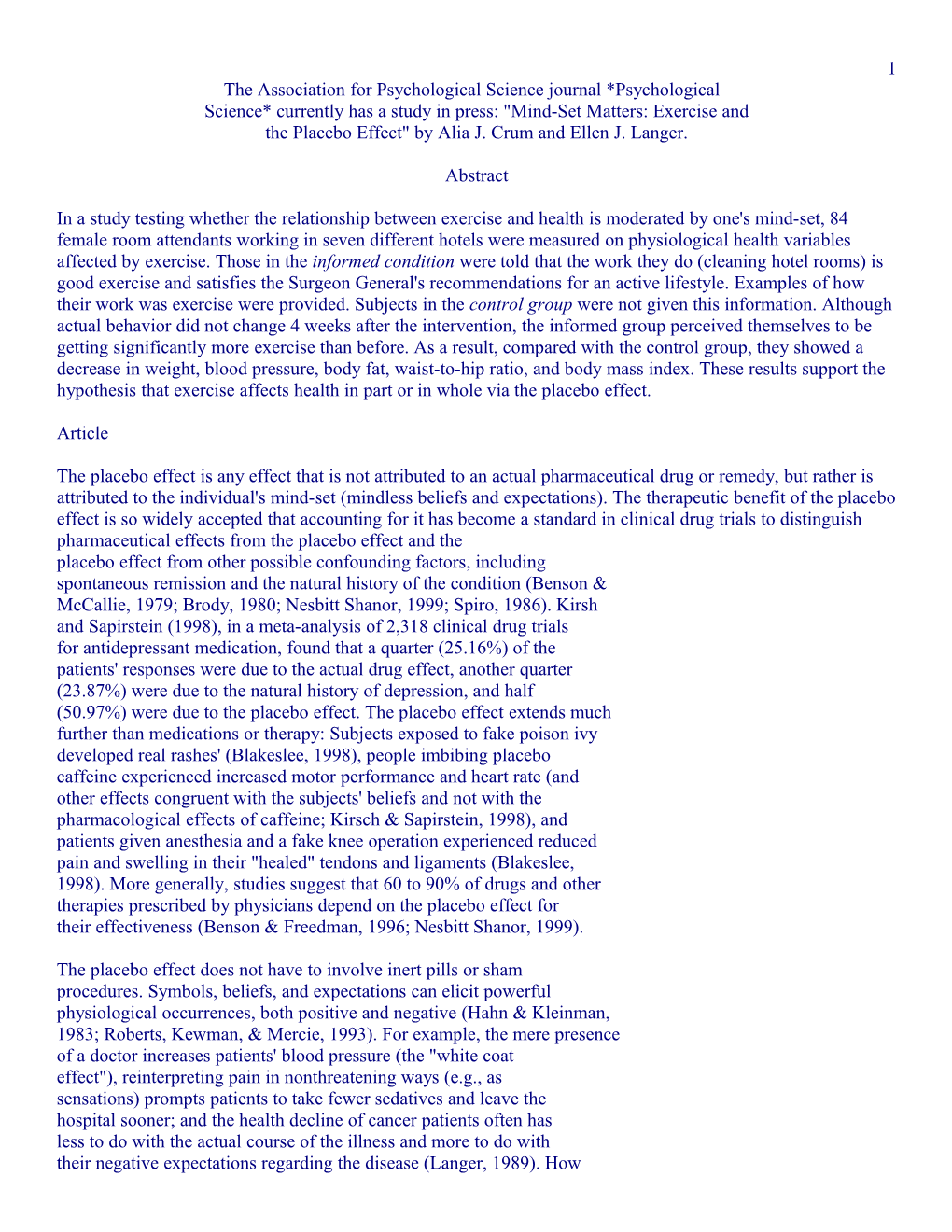1
The Association for Psychological Science journal *Psychological
Science* currently has a study in press: "Mind-Set Matters: Exercise and
the Placebo Effect" by Alia J. Crum and Ellen J. Langer.
Abstract
In a study testing whether the relationship between exercise and health is moderated by one's mind-set, 84 female room attendants working in seven different hotels were measured on physiological health variables affected by exercise. Those in the informed condition were told that the work they do (cleaning hotel rooms) is good exercise and satisfies the Surgeon General's recommendations for an active lifestyle. Examples of how their work was exercise were provided. Subjects in the control group were not given this information. Although actual behavior did not change 4 weeks after the intervention, the informed group perceived themselves to be getting significantly more exercise than before. As a result, compared with the control group, they showed a decrease in weight, blood pressure, body fat, waist-to-hip ratio, and body mass index. These results support the
hypothesis that exercise affects health in part or in whole via the placebo effect.
Article
The placebo effect is any effect that is not attributed to an actual pharmaceutical drug or remedy, but rather is attributed to the individual's mind-set (mindless beliefs and expectations). The therapeutic benefit of the placebo effect is so widely accepted that accounting for it has become a standard in clinical drug trials to distinguish pharmaceutical effects from the placebo effect and the
placebo effect from other possible confounding factors, including
spontaneous remission and the natural history of the condition (Benson &
McCallie, 1979; Brody, 1980; Nesbitt Shanor, 1999; Spiro, 1986). Kirsh
and Sapirstein (1998), in a meta-analysis of 2,318 clinical drug trials
for antidepressant medication, found that a quarter (25.16%) of the
patients' responses were due to the actual drug effect, another quarter
(23.87%) were due to the natural history of depression, and half
(50.97%) were due to the placebo effect. The placebo effect extends much
further than medications or therapy: Subjects exposed to fake poison ivy
developed real rashes' (Blakeslee, 1998), people imbibing placebo
caffeine experienced increased motor performance and heart rate (and
other effects congruent with the subjects' beliefs and not with the
pharmacological effects of caffeine; Kirsch & Sapirstein, 1998), and
patients given anesthesia and a fake knee operation experienced reduced
pain and swelling in their "healed" tendons and ligaments (Blakeslee,
1998). More generally, studies suggest that 60 to 90% of drugs and other
therapies prescribed by physicians depend on the placebo effect for
their effectiveness (Benson & Freedman, 1996; Nesbitt Shanor, 1999).
The placebo effect does not have to involve inert pills or sham
procedures. Symbols, beliefs, and expectations can elicit powerful
physiological occurrences, both positive and negative (Hahn & Kleinman,
1983; Roberts, Kewman, & Mercie, 1993). For example, the mere presence
of a doctor increases patients' blood pressure (the "white coat
effect"), reinterpreting pain in nonthreatening ways (e.g., as
sensations) prompts patients to take fewer sedatives and leave the
hospital sooner; and the health decline of cancer patients often has
less to do with the actual course of the illness and more to do with
their negative expectations regarding the disease (Langer, 1989). How
exactly did the change in mind-set bring about such significant
physiological changes? Conventional science assumes that in order for
weight to be lost and body fat to be reduced, certain biological and
physiological events must also take place. In the case of BP, it is
assumed that it is lowered during exercise because the peripheral blood
vessels are dilated, and that, over time, the attenuating effect of
exercise on the sympathetic nervous system's activity helps to reduce
rennin-angiotensin system activity, reset baroreceptors, and promote
arterial vasodilation (which helps to control BP; CDC, 1996). In the
case of weight, it is assumed that exercise helps to reduce body fat by
increasing energy expenditure: To the extent that energy expenditure
exceeds caloric intake, the result is weight loss (theoretically, about
1 pound of fat energy is lost for each additional 3,500 kilocalories
burned; CDC, 1996).
Here's one more excerpt:
Given this knowledge, one interpretation of our results regarding the
relationship between increased perceived exercise and improved health
would be that they were mediated by a change in behavior. The data
collected in this study, however, do not support this conclusion. As
mentioned, the room attendants did not report any increase in exercise
outside of work, nor did they experience any increase in workload over
the course of the study. In addition, the subjects reported their habits
had not changed over the past 30 days with respect to how much they ate
(including servings of sugary foods and vegetables) and how much they
drank (caffeine, alcohol, and water). Thus, neither increased exercise
nor decreased caloric intake was reported by the subjects.
Of course, it is possible that the room attendants actually did change
their behavior actually did cut back on calories, improve the quality of
the food they ate, or work harder or more energetically-but did not
report such changes. However, previous research has found it very
difficult to change behavior of this sort (Deutschman, 2005). Thus, even
if these behavioral changes did occur as a result of the intervention,
that too would make these results interesting.
In summary, the data collected in this study, coupled with previous
research indicating the difficulty of changing behavior, make it
unlikely that the relationship between mind-set and improvements in
health was mediated by a change in behavior. In either case, whether the
change in physiological health was brought about directly or indirectly,
it is clear that health is significantly affected by mind-set.
[end excerpt]
According to the author note, reprint requests may be sent to Alia Crum
or Ellen Langer, Department of Psychology, Harvard University, 1330
William James Hall, 33 Kirkland St., Cambridge, MA 02138, e-mail:
> or <>.
